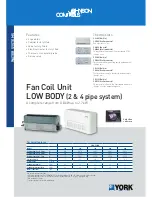
RF Declaration
Equipment that complies with directive 2004/108/EC
concerning electromagnetic compatibility (EMC) and the
technical requirements of EN60974-10 is designed for use in
industrial buildings and not those for domestic use where
electricity is provided via the low voltage public distribution
system. Di
ffi
culties may arise in assuring class A
electromagnetic compatibility for systems installed in
domestic locations due to conducted and radiated
emissions.
In the case of electromagnetic problems, it is the
responsibility of the user to resolve the situation. It may be
necessary to shield the equipment and fit suitable filters on
the mains supply.
LF Declaration
Consult the data plate on the equipment for the power
supply requirements.
Due to the elevated absorbance of the primary current from
the power supply network, high power systems a
ff
ect the
quality of power provided by the network. Consequently,
connection restrictions or maximum impedance
requirements permitted by the network at the public network
connection point must be applied to these systems.
In this case the installer or the user is responsible for
ensuring the equipment can be connected, consulting the
electricity provider if necessary.
Materials and their disposal
The equipment is manufactured with materials, which do not
contain any toxic or poisonous materials dangerous to the
operator.
When the equipment is scrapped, it should be dismantled
separating components according to the type of materials.
Do not dispose of the equipment with normal waste. The
European Directive 2002/96/EC on Waste Electrical and
Electronic Equipment states the electrical equipment that
has reached its end of life must be collected separately and
returned to an environmentally compatible recycling facility.
Handling of Compressed gas cylinders and
regulators
All cylinders and pressure regulators used in welding
operations should be handled with care.
Never allow the electrode, electrode holder or any other
electrically “hot” parts to touch a cylinder.
Keep your head and face away from the cylinder valve outlet
when opening the cylinder valve.
Always secure the cylinder safely
Never deface or alter any cylinder
4
Summary of Contents for JT-200D
Page 26: ...Electrical schematic 7 25 ...
Page 27: ...Parts list 8 JT 200D 26 ...
Page 29: ...JT 315D 28 ...






































